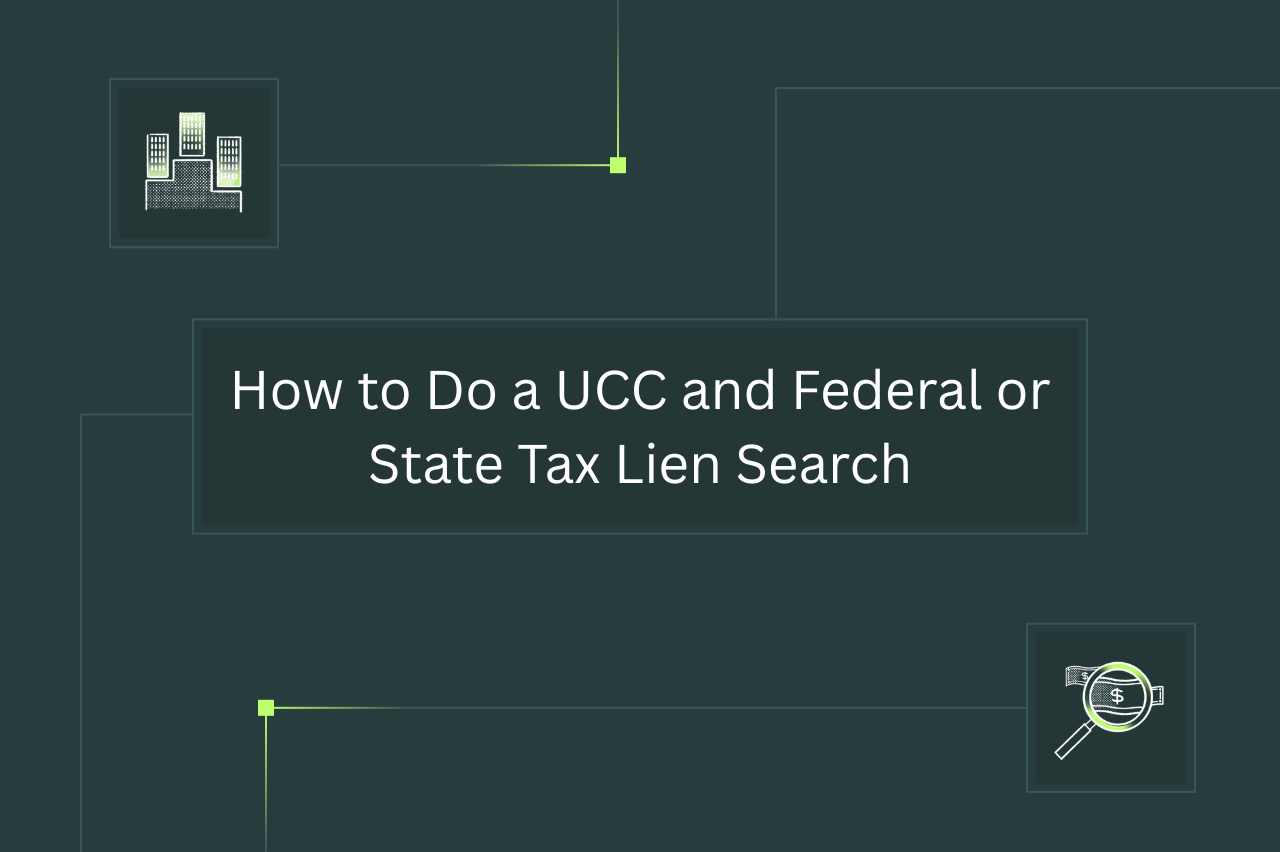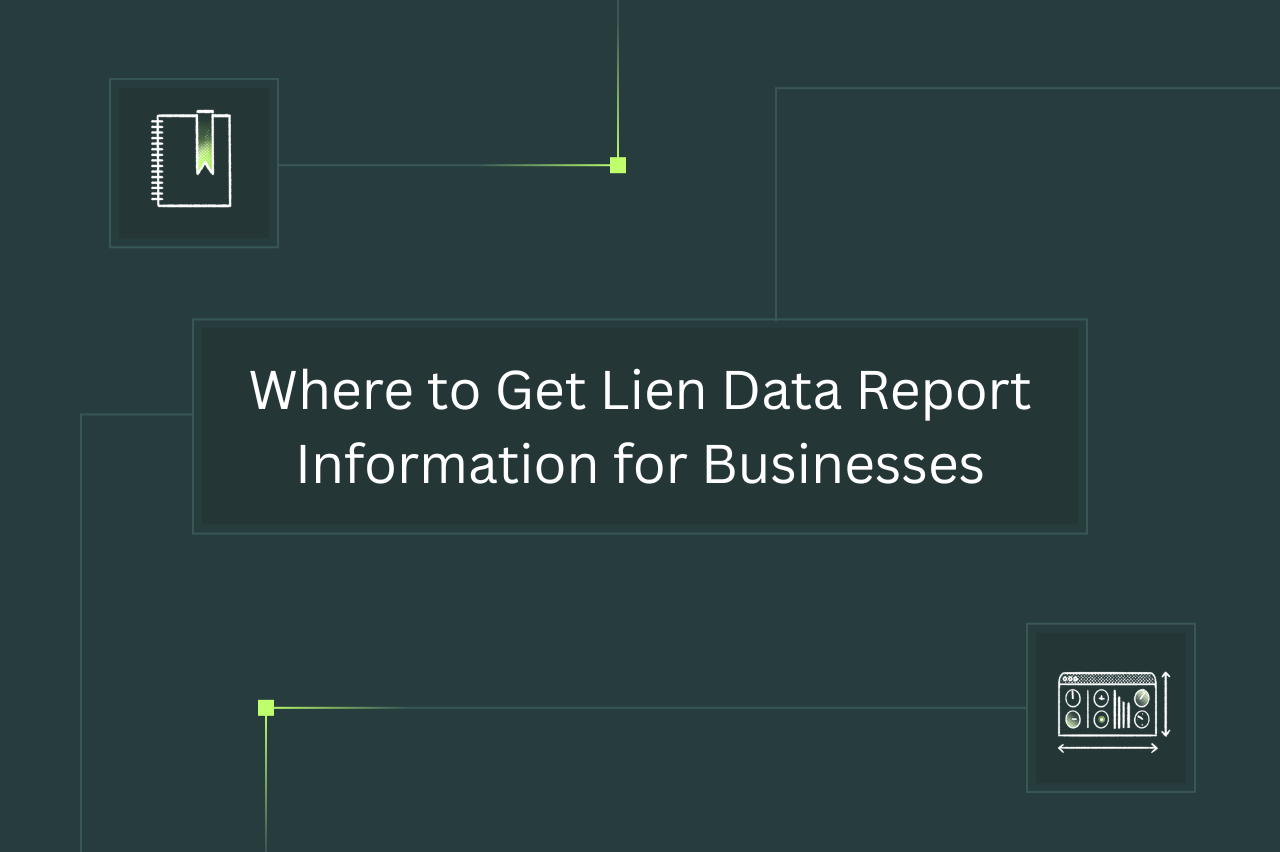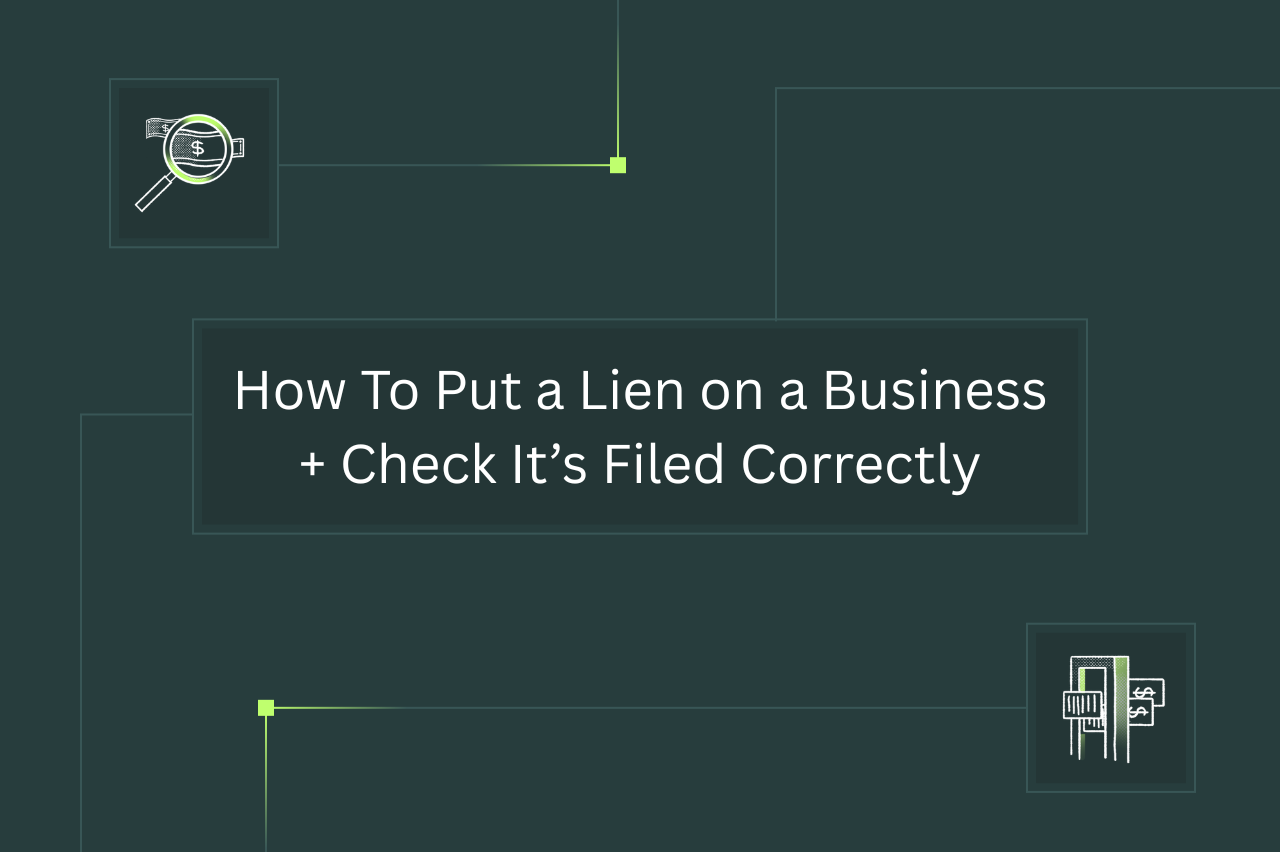In brief:
- Searching for UCC or federal & state tax liens means looking for legal claims against a business or business owner’s property due to unpaid debts. For UCC liens, the debt is on a loan from a private creditor. For Federal & State tax liens, the debt is on taxes owed to a federal or state government.
- Conducting lien searches is part of due diligence. It may signal a business is in danger of having its property repossessed, or may have trouble securing additional funding because a government or creditor has already staked a claim to its collateral assets.
- Liens can be found at state Secretary of State offices or state/county recorder’s offices. They can also be ordered directly from the IRS via a Freedom of Information Act request. However, the fastest and most comprehensive search method is to use an automated third-party tool (like Middesk) that queries these government databases all at once.
Debt can be a significant risk factor in a B2B relationship. A business in debt could be at risk of losing property or other assets critical to its functioning. And even if it isn’t, it may have trouble getting additional financing if it doesn’t have enough collateral to offer to another lender. This may make the business unattractive as a potential client or partner.
So as a company, how can you find out if a business you want to onboard is having problems with debt? One option is to have an awkward conversation with the company’s accounting department. Another is to search for liens. These are publicly-available notices that a government or creditor is staking a legal claim to an entity’s property if said entity fails to repay its debts.
This article will go over two particular types of liens – UCC liens and Federal & State tax liens – and some ways a company can search for them for KYB and risk management purposes.
- What is a UCC lien search?
- What is a federal or state tax lien search?
- What’s the purpose of lien searches for business verification?
- 4 ways to search for UCC and federal or state tax liens
- How to search for a UCC or federal/state tax lien
- 4 UCC and federal/state tax lien search services
- See a bigger picture for risk assessment with Middesk
Let’s first talk a bit about what it means to search for federal & state tax liens and UCC liens, and why businesses should want to do so as part of a KYB process.
A UCC lien search is the process of looking up whether an entity (i.e. person or business) has any Uniform Commercial Code (UCC) liens filed against it. A UCC lien is a legal notice from a creditor laying claim to collateral from a borrower on a loan if the borrower defaults on the loan.
Basically, if a person or business takes out a loan and then later defaults on it, UCC liens determine the order in which creditors can seize the borrower’s collateral to repay the debt. A UCC lien can also indicate which assets are to be prioritized for seizure in the event of a default.
Whether you’re an enterprise level organization or a regional or community bank, it’s crucial that you can onboard businesses with confidence and care.
{{gated-content-block="/events/webinar-bev-break-uccliens-jun-2025"}}
A federal or state tax lien search is a check to see if an entity has any tax liens filed against it by a federal or state government. These liens are documents allowing a federal or state government to lay legal claim to an entity’s assets if said person or business has unpaid taxes.
In short, UCC liens are claims to collateral by private creditors when an entity owes a debt to them via a loan. Federal and state tax liens are claims to property by governments when an entity owes debts to them in the form of unpaid taxes.
When it comes to KYB (and KYC), a UCC or tax lien search isn’t so much about identity verification as it is about customer due diligence and risk management. An outstanding lien against a business could be a significant risk indicator, as it could signal a business is in debt and is in danger of losing assets if it doesn’t repay its debts.
The assets being held as collateral could be critical to the business’s operations, which could be detrimental to you if you choose to onboard them. Collecting the data you need to perform due diligence and put together a lien data report is critical to mitigating your risk in these situations.
Even if the business is eventually able to deal with the lien by paying off its debts, an active lien could still be a risk factor in the meantime. This is because it could hamper the business’s efforts to secure additional funding. It would signal to a lender that they aren’t first in line to collect collateral from the business if it defaults on its debts. The lender may not see any remaining collateral that they’re interested in, or they may fear that the business will run out of assets before it’s their turn to collect on what they’re owed.
In short, a lien could be a warning sign to a company that a business will be unable to fulfill its client or partner obligations in the near future. That might make the business too risky to start or continue a relationship with.
There are a few places where you can conduct a tax lien search or UCC search, and most are official U.S. government agencies. However, the level of government with which liens are recorded differs from state to state.
For some states, liens are recorded at the federal or state level, so searches for them don’t need to be quite as precise. For other states, liens are recorded at the county level, which can make searches trickier depending on how a lien was filed. This is because you need to know in exactly which county the debtor lives or does business, or where the collateral property is actually located. So you may need to search in multiple places before you find an applicable lien.
With that said, here are the main avenues for performing tax or UCC lien searches.
1. Use a dedicated lien search tool
Third-party tools, like Middesk’s Business Underwriting solution, are able to pull business filing data – including on UCC or tax liens – directly from official (government) sources. This takes care of a lot of the heavy lifting in terms of determining exactly where the lien was filed. Thus, they generally provide more flexibility in how liens can be searched for: businesses names, individual names, addresses, filing numbers, filing types, filing statuses, and so on.
These tools also search a number of databases simultaneously, so you can perform one search instead of dozens.
2. Search business records at a state Secretary of State office
Most businesses in the U.S. are registered at the state level, so their information will be recorded with a state Secretary of State office. Each of these offices has an online portal that allows for searching business filings to get information on businesses registered to operate in the state. This includes UCC liens and federal/state tax liens.
You can also try a UCC-11 search. This involves downloading a UCC-11 form – an official request for UCC information – from a state Secretary of State website. Then it requires filling out the form, sending it to the state Secretary of State office, and waiting for documents to arrive.
This can be a slow process, and it often requires signing up for an account and/or paying fees.
3. Look for liens on a state or county recorder’s office website
Another place you can search for tax liens is at a state or county recorder’s office (or its website). This can be a complicated process, though, as where liens are recorded can differ depending on state law.
Some states – such as Colorado, Mississippi, Illinois, and South Carolina – have centralized tax lien registries that simplify the search. In other states, however, tax liens are recorded at the county level. And which county a lien is recorded in can differ depending on things like whether the debtor is registered as a business or one of its owners. So the lien may be where the owner lives or where the business operates, or even where the collateral assets are located.
Again, this can be a painstaking process that may require paying money to get hard copies of documents (if this is necessary).
4. Get a list from the IRS via a Freedom of Information Act request
The IRS has an Automated Lien System (ALS) database that automatically collects and files tax liens from all 50 states as well as DC. It’s possible to get a copy of this database by submitting a Freedom of Information Act (FOIA) request to the IRS. This can be done online, by fax, or by mail, and they have clear Freedom of Information Act guidelines to follow to submit your requests properly.
While lien searches can be conducted manually, the fastest way to do a UCC or tax liens search is to use an automated tool. A solution such as an API can quickly aggregate data from multiple sources, saving time that would otherwise be used checking individual sources one by one.
Here’s an example of how one works:
1. Specify the business and document(s) requested
First, you need the name of the business you want to search for a lien for. Preferably, have the business’s full legal name (as some businesses can have colloquial or “doing business as” names) as it was added to the system. Then specify that you want to search for a lien; in this case, you can specify whether to search for UCC filings or tax lien filings. You can also specify the exact kinds of documents you want to search for.

2. Retrieve the results when they are ready
Finally, get the search results when the request finishes processing. For this, you need the searched business’s name as well as the request ID.

If you’re trying to search for tax lien records and/or UCC lien records at scale, again, an automated third-party search service is the way to go. Here are some leading industry options.
1. Middesk
Mitigating underwriting risk is all about identifying key risk signals and filtering out high-risk businesses. Middesk Assess helps businesses do this efficiently by searching for UCC, federal, and state tax liens across all of the primary government sources. It provides information on the debtor, creditor, and collateral; when the lien was filed and when it lapsed (or will lapse); where the lien was filed; whether the lien is active or not; and more.
Check out our on-demand demo below of how Middesk’s Credit Assessment tool can automate UCC and tax lien searches for your business.
{{gated-content-block="/events/productdemo-creditassessment-august-2025"}}
2. First Corporate Solutions
This company has an Online UCC System that allows for searching for liens by debtor name (including partial names and wildcards) or file number. It also allows for filtering results by name, address, city, and filing type (UCC, tax, judgment, bankruptcy, etc.). Finally, it allows for printing reports or copies of documents. Its information is from state filing offices.
3. CSC
This company’s UCC Search service allows for searching all jurisdictions for UCC filings. Its keyword-logic search engine allows for finding names by variations, misspellings, or other errors. It also allows for recurring, time-based searches to automatically get updated information on certain (groups of) liens.
4. Wolters Kluwer
This company’s Lien Solutions iLien system can search for UCC liens, federal & state tax liens, and many other types of business documents useful in KYB risk assessment. It allows for searching across multiple jurisdictions through the web app or by phone, fax, or client/server software.
Liens can provide clues as to what financial and/or operational shape a business is in before onboarding it. But they’re far from the only pieces of information and documentation a company should look up when assessing a business’s potential risk.
This is why Middesk’s Business Verification solution and Business Underwriting tool provide a great deal of extra contextual data to help you make more accurate B2B risk evaluations. This includes registration status, tax ID, watchlist presence, industry classification, copies of official documentation, digital footprint, litigations, and more.
Schedule a demo to learn how Middesk can help you verify B2B relationships and mitigate lending risk by identifying risks early by completing UCC and tax lien searches.








